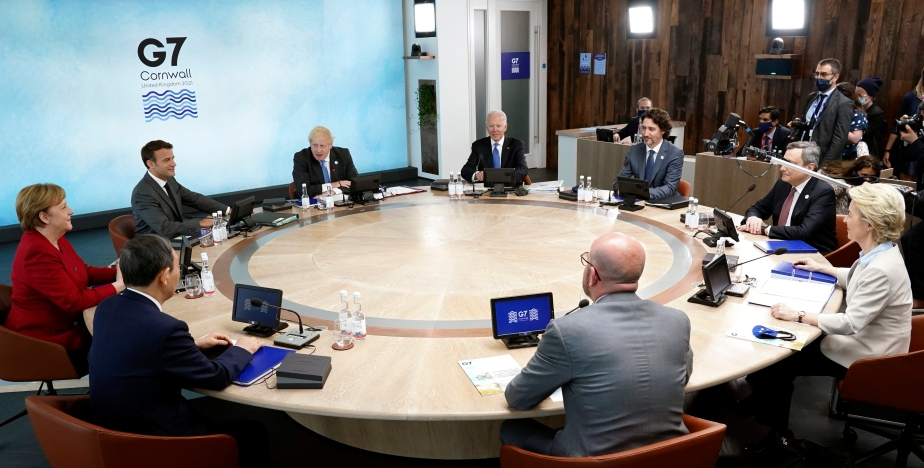
Photo by Kevin Lamarque/Pool via AP.
Speaking to the United Nations Human Rights Council about the impacts of climate change, High Commissioner for Human Rights Michelle Bachelet warned: “The world has never seen a threat to human rights of this scope.”
How has the G7 responded to this warning?
Promises from the G7 summit in Cornwall, England are expected to include committing to halve their carbon emissions by 2030 relative to 2010; achieving net-zero carbon emissions by 2050; ending most government support for the fossil fuel sector overseas; and increasing climate finance contributions to cut carbon emissions and cope with the existing impacts (extreme weather, rising sea levels) of climate change.
Let’s look more closely at each of these commitments:
1- Halving carbon emissions by 2030
G7 countries are responsible for about 25 percent of global greenhouse gas emissions. That amounted to about 8.6 billion tonnes of CO2 in 2019. There is no clear plan yet from the G7 as to how they will reduce this by one-half.
2- Reaching net-zero emissions by 2050
The concept of “net-zero” has been described by climate scientists as a dangerous trap. It does not strictly mean reducing emissions, but rather includes carbon offsets (for example, an oil company planting a forest) and employing technology that does not yet exist on a vast scale to capture carbon in the air.
3- Ending fossil fuel subsidies
G7 governments provide at least $87.7 billion a year in support of fossil fuels. This despite the pledge by G20 governments in 2009 and G7 governments in 2016 to eliminate “inefficient fossil fuel subsidies” by 2025.
4- Increasing climate financing
Current commitments from G7 countries amount to $36 billion by 2025. This despite their pledge in 2016 to provide $100 billion a year by 2020 to developing countries to help them cope with the impacts of climate change (such as rising sea levels) and to develop their economies within a net-zero carbon framework.
We will also be looking for statements on migration and military spending.
Migration
The UN says that weather emergencies have forced around 21.5 million people a year to move since 2010 and that roughly 90 percent of refugees come from countries that are the most vulnerable and least ready to adapt to the impacts of climate change.
Military spending
In 2020, G7 countries spent $1.04 trillion on military expenditures. The US spent an estimated $778 billion, the UK $59.2 billion, Germany $52.8 billion, France $52.7 billion, Japan $49.1 billion, Italy $28.9 billion, and Canada $22.8 billion.
There are concerns that the world’s militaries, which themselves are responsible for an estimated 1.8 billion tonnes of carbon pollution each year, will be increasingly used against climate migrants at borders as they flee violence and disruption.
COP26 and human rights defenders
The UN COP26 climate summit is scheduled for November 1-12 in Glasgow, Scotland. Peace Brigades International continues to follow this with particular concern for the risks faced by human rights defenders challenging environmental breakdown.
Four land and environmental defenders have been killed every week on average since the Paris climate agreement was reached at COP21 in Paris in December 2015.
Please follow us in the coming weeks and months for more on the relationship between climate change and human rights.
Please, consider donating to PBI-USA. You can make a safe donation here.
Make a Difference, help protect human rights defenders!
Support our 40th Year Anniversary Campaign by making a donation
2021 is Peace Brigades International’s 40th Year Anniversary!
Whether human rights defenders fight for social equality, justice, or environmental and indigenous rights, we must protect their vision of the future. For 40 years, PBI has provided protection so defenders can continue their work. With your support, we can ensure that PBI-USA can continue to make space for peace.
Please consider donating to our campaign.
Make checks payable:
Peace Brigades International-USA
P.O. Box 75880
Washington, DC 20013
www.pbiusa.org
Don’t forget to connect with us on social media for the latest updates and human rights news.
